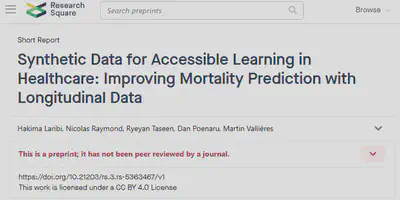Synthetic Data for Accessible Learning in Healthcare: Improving Mortality Prediction with Longitudinal Data

Date
2024-11-04
Authors
- Hakima Laribi1
- Nicolas Raymond1
- Ryeyan Taseen2
- Dan Poenaru3,4
- Martin Vallières1,5
1 Department of Computer Science, Université de Sherbrooke, Sherbrooke, QC, Canada
2 Department of Medicine, Cambridge Memorial Hospital, Cambridge, Canada.
3 Department of Pediatric Surgery, McGill University Health Centre, Montreal, Canada.
4 Centre for Outcomes Research and Evaluation (CORE), Research Institute of the McGill University Health Centre, Montreal, Canada.
5 Centre de recherche du Centre hospitalier universitaire de Sherbrooke, Sherbrooke, Canada.
Abstract
Accurate prediction of medium-term survival after admission is necessary for identifying end-of-life patients who may benefit from earlier goals of care (GOC) discussions. While previous studies have leveraged admission data from electronic health records (EHRs) to predict the hospital one-year mortality risk (HOMR) score, they focused on single admissions, without considering longitudinal patient history and its impact on prognostication. To address this gap, we developed the Ensemble Long Short-Term Memory (ELSTM) neural network, which learns from multiple visits of the same patient to improve the accuracy of the HOMR score. Furthermore, in this work, we generated a synthetic dataset and made it publicly available to encourage further research in this area while safeguarding patient privacy.